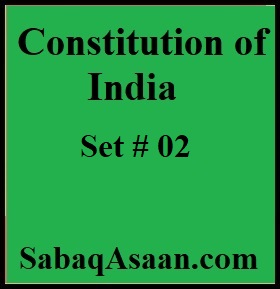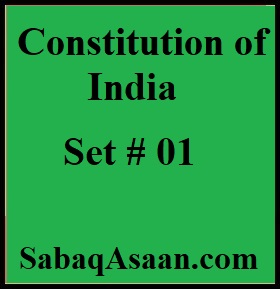44 important Constitution of India MCQs

11. An ordinance, promulgated by the, President:
(a) Will lapse, automatically after two, months
(b) Will lapse on, the expiration of six, weeks from the, meeting of the, Parliament.
(c)Will automatically, become a law after, six months
(d) Will continue to, be in force till it is, superseded by an Act of, the Parliament
See Answer
(b) Will lapse on the expiration of six weeks from the meeting of the Parliament.
12. The President, can promulgate, an ordinance:
(a) When the Lok Sabha, has been dissolved
(b) When there is a, conflict between the, two Houses regarding, a particular bill
(c) When a bill passed, by the Lok Sabha is ,not passed by the ,Rajya Sabha
(d) When both the Houses of the Parliament are not in session
See Answer
(d) When both the Houses of the Parliament are not in session
13. If a Minister of a state, wants to resign, to whom he should address, the letter of resignation.
(a) Chief Minister,
(c) Governor of the State,
(b) Speaker of Vidhan Sabha,
(d) Leader of his political party,
See Answer
(a) Chief Minister
14. A member of Lok Sabha, has to ask a question, in the parliament which has been, list starred question. To this, he will be given:
(a) A written answer
(c) No answer,
(b) An oral answer,
(d) An immediate answer,
See Answer
(a) A written answer
15. Amongst the following, for whose removal parliament’s, resolution is not needed:
(a) Chief Election Commissioner,
(b) Judge of Supreme Court,
(c) Governor of a State,
(d) Comptroller and Auditor General,
See Answer
(b) Judge of Supreme Court
16. When the Governor receives, a Bill passed by the, State Legislative Assembly, which of the, would be most appropriate, for the Governor as an agent ,of the Centre:
(a) Refer the Bill to the President,
(b) Exercise veto over the Bill,
(c) Give assent to the Bill,
(d) Keep the Bill Pending,
See Answer
(a) Refer the Bill to the President
17. To which of the following, courses the following, Bills the President, must accord his sanction, without sending, it back for fresh, consideration?
(a) Ordinary Bills,
(b) Bills passed by, both the Houses of the, Parliament
(c) Bill seeking, Amendment to the, Constitution
(d) Finance Bills,
See Answer
(d) Finance Bills
18.The Indian, Parliament, can invade, a State List if:–
I. A subject in the, Sate List assumes, national importance.
II. A proclamation, of emergency, has been, issued by the President, of India.
III. The Supreme Court, of India, authorizes the, Parliament, to do so.
(a) I and II,
(b) II and III,
(c) II alone,
(d) II alone,
See Answer
(a) I and II
19. In the case, of a conflict, between the Centre ,and a State, in respect of a, subject included, in the Concurrent List:
(a) The State Law prevails,
(B) The matter is, resolved by the Supreme, Court
(C) The law which, had been passed first,’ would prevail
(D) The “Union Law” prevails,
See Answer
(D) The Union Law prevails
20. Who is the, highest Law Officer, of a state?
(a) Attorney General,
(b) Solicitor General,
(c) Advocate General,
(d) Secretary, General Law Department,
See Answer
(c) Advocate General


